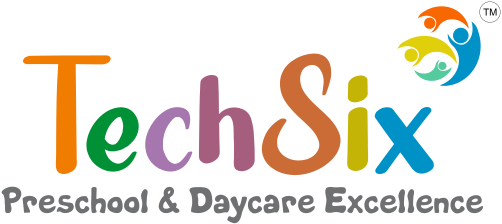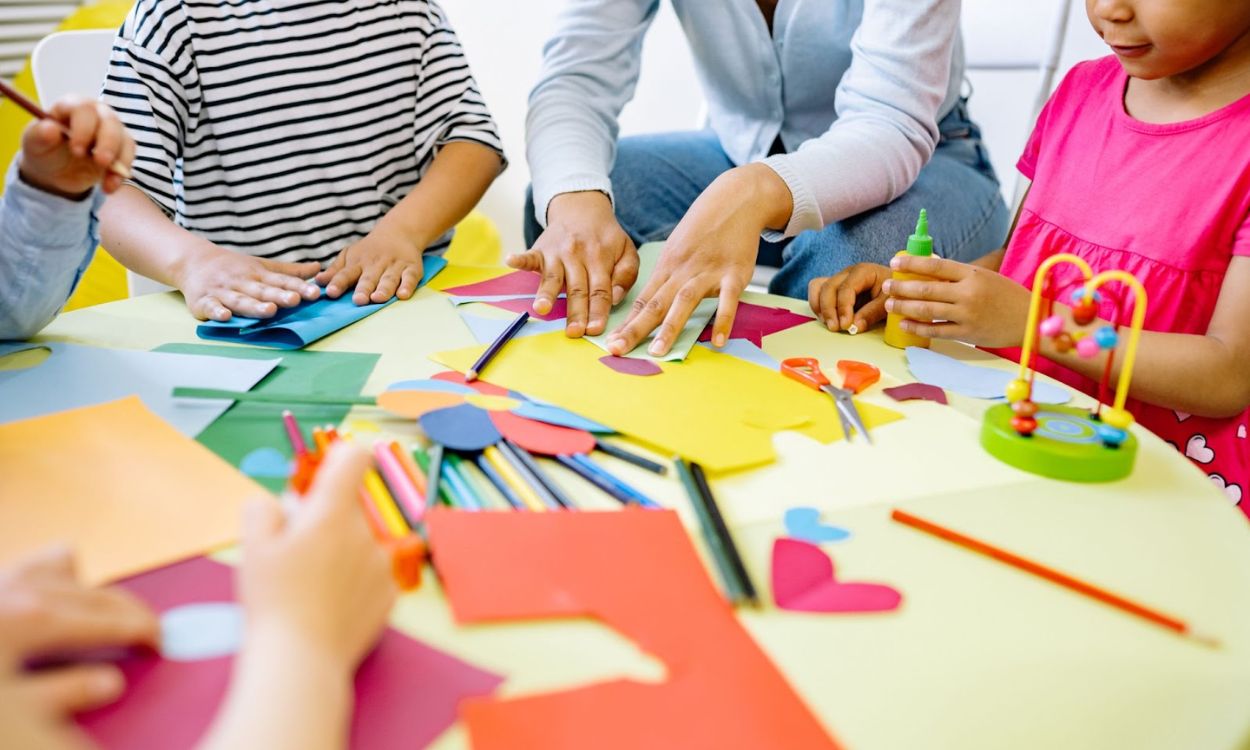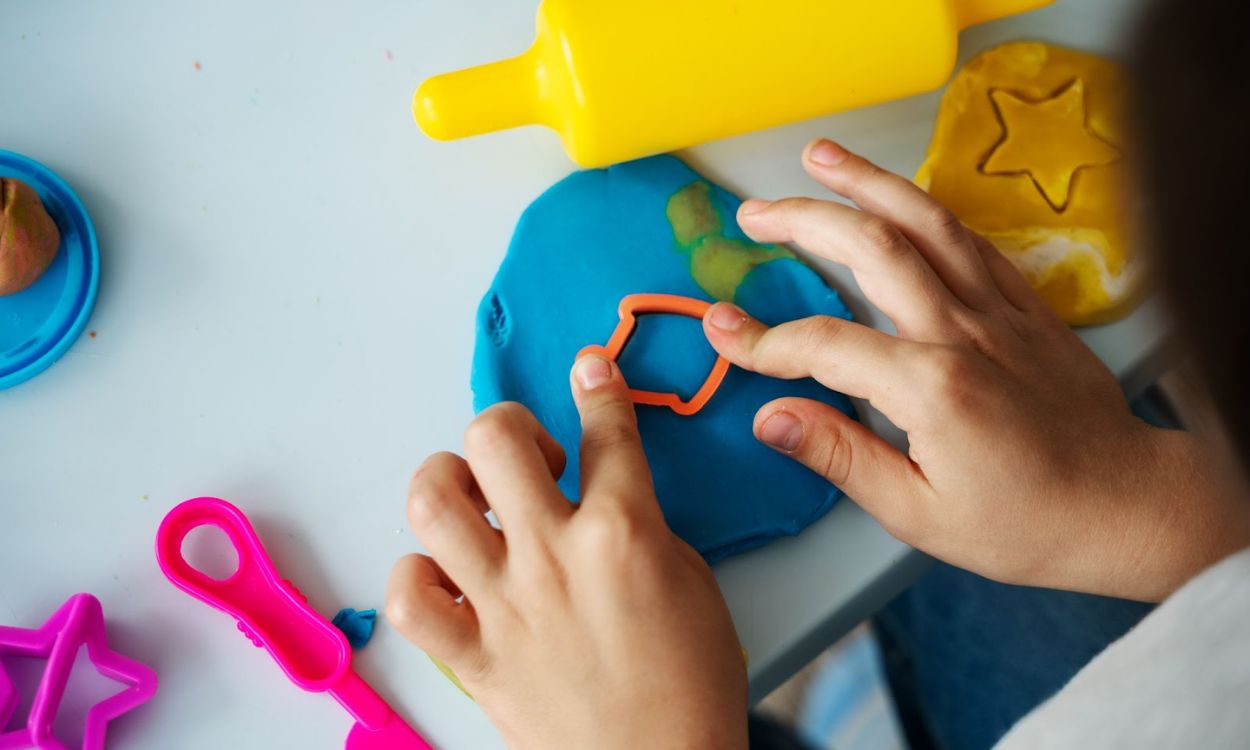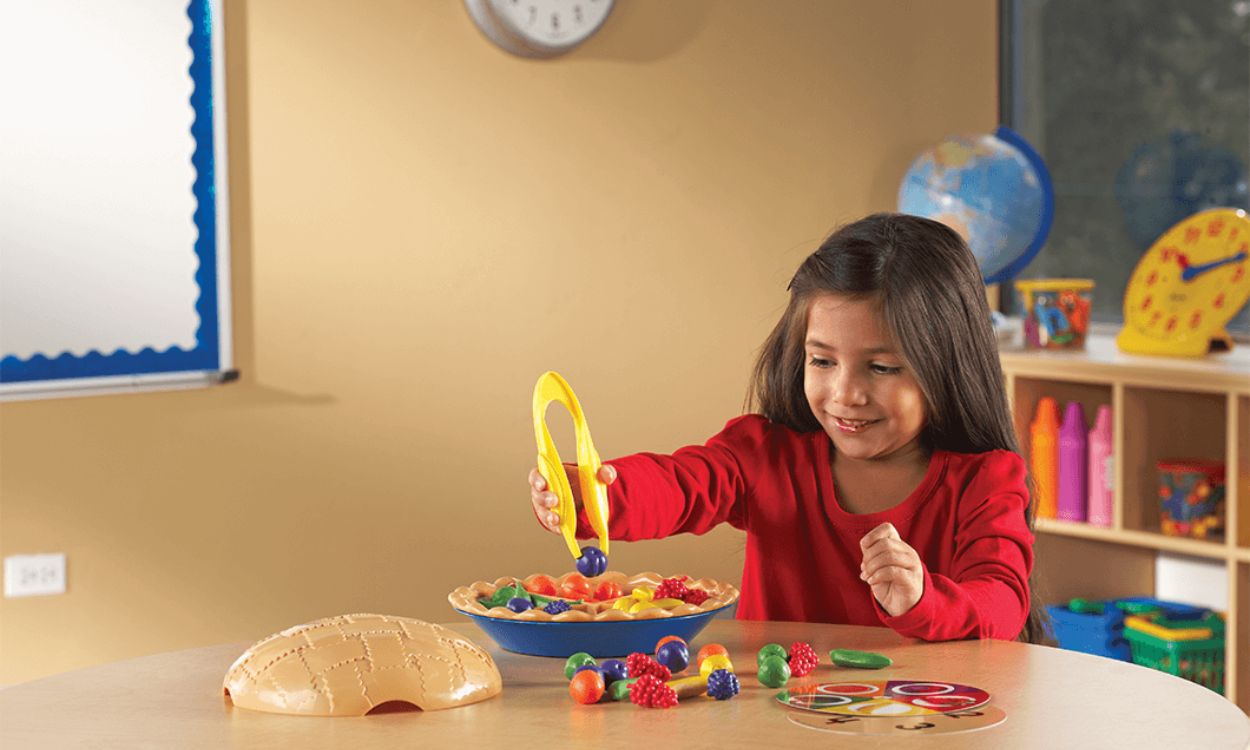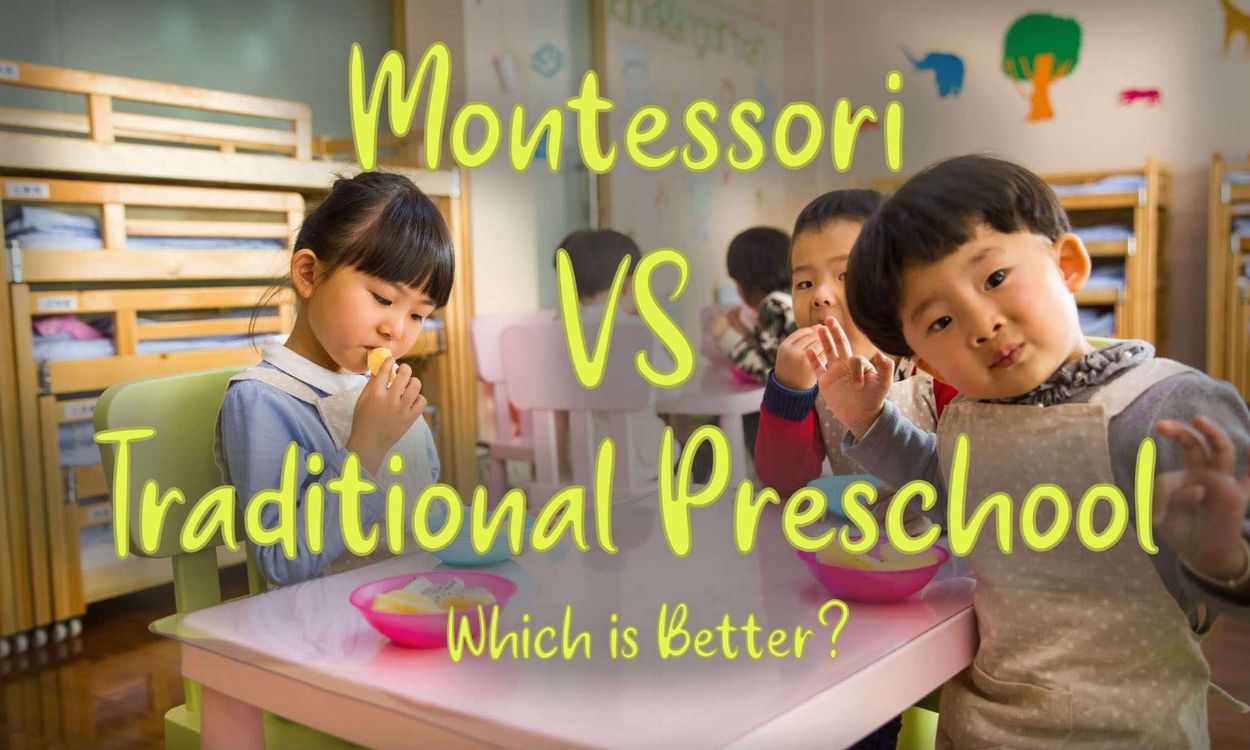Creativity plays a crucial role in a child’s development, enhancing their cognitive abilities, motor skills, and problem-solving capabilities. Engaging preschoolers in DIY crafts not only fosters creativity but also strengthens their imagination and coordination. For parents looking for a play school in Gurgaon that emphasizes hands-on learning, TechSix provides an ideal environment where children can explore their creativity through fun activities. Here are some fun and easy DIY craft ideas for preschoolers that can keep them entertained while boosting their creative thinking. 1. Handprint Art Handprint art is a simple yet effective way to engage preschoolers in creative activities. It allows them to explore colors, shapes, and textures while developing fine motor skills. Materials Needed: Non-toxic paints White paper or canvas Paintbrushes Wet wipes for cleanup Instructions: Pour different colors of paint onto a palette. Let the child dip their hands in the paint and press them onto the paper to create handprint designs. Encourage them to make animals, flowers, or trees using their handprints. Once dry, use markers to add details like eyes, stems, or leaves. 2. Paper Plate Masks Paper plate masks are a great way to encourage role-playing and storytelling. Materials Needed: Paper plates Scissors Colored markers or paints Glue and craft sticks Feathers, stickers, or glitter for decoration Instructions: Cut eye holes in the paper plate. Let the child paint or color the mask with their favorite design. Add embellishments like feathers, stickers, or glitter for extra fun. Attach a craft stick to the bottom for easy holding. Encourage children to create characters and act out their stories. 3. Pasta Necklace Making pasta necklaces is an excellent way to improve hand-eye coordination and color recognition. Materials Needed: Dry pasta (penne or macaroni) String or yarn Food coloring (optional) Plastic bag Instructions: If desired, dye the pasta by placing it in a plastic bag with a few drops of food coloring and shaking it. Let it dry. Cut a piece of string or yarn and tie a knot at one end. Let the child thread the pasta onto the string. Tie the ends together to complete the necklace. 4. Egg Carton Caterpillar This craft is perfect for teaching kids about insects while developing their creativity. Materials Needed: Empty egg carton Paint and paintbrushes Pipe cleaners Googly eyes Glue Instructions: Cut an egg carton into a row of connected cups. Let the child paint the caterpillar’s body. Once dry, attach googly eyes to the front cup. Insert pipe cleaners as antennae and legs. Use markers to add details like a smiling face. 5. Toilet Paper Roll Binoculars Encourage preschoolers to explore their surroundings with DIY binoculars. Materials Needed: Two toilet paper rolls Paint or colored paper Glue or tape String Instructions: Paint the toilet paper rolls or wrap them with colored paper. Glue or tape them together side by side. Punch holes on the sides and attach a string to wear around the neck. Let kids go on an adventure and observe nature through their handmade binoculars. 6. Sponge Painting Sponge painting is an easy and mess-free craft that helps children explore textures and colors. Materials Needed: Sponges (cut into shapes) Washable paint White paper Instructions: Dip the sponge into paint and press it onto the paper. Experiment with different shapes and colors to create beautiful artwork. Let the child use a brush to add details. TechSix – Preschool & Daycare Excellence TechSix – Preschool & Daycare Excellence fosters a nurturing environment where young minds grow through innovative learning and creative exploration. Beyond academics, TechSix encourages hands-on activities like DIY craft ideas for preschoolers to boost creativity, enhance fine motor skills, and inspire self-expression. Engaging in fun, simple crafts helps children develop problem-solving abilities while making learning enjoyable. Preschool Admissions are now open for the 2025-26 Academic Session!! – Enroll Your Kid Now Conclusion DIY crafts for preschoolers are a fantastic way to nurture creativity, enhance motor skills, and encourage self-expression. These simple yet engaging activities will not only keep children entertained but also help them develop essential life skills. Try these fun crafts with your little ones and watch their creativity flourish! Don’t Miss: Healthy Eating Habits for Preschoolers: Fun and Nutritious Meal Ideas
How to Make Learning Fun with Hands-On Activities
In today’s fast-paced world, keeping students engaged in the learning process is more challenging than ever. Textbooks and lectures alone can quickly lose their charm. So, what’s the secret sauce to sparking curiosity and making learning genuinely enjoyable? The answer lies in hands-on activities—learning by doing. At TechSix, the best day care school in Gurgaon, we embrace this approach to create a joyful, stimulating environment where young minds grow through exploration, creativity, and care. Hands-on learning isn’t just about crafts or experiments; it’s about actively involving students in the learning process, allowing them to touch, create, explore, and solve real-world problems. This approach stimulates critical thinking, improves retention, and, most importantly, makes learning fun. Why Hands-On Activities Matter Research shows that students retain up to 75% of what they do, compared to only 10% of what they read. When learners physically engage with a subject, they connect with it on a deeper level. Whether it’s building a volcano in science class or using building blocks to learn math, the hands-on method transforms abstract concepts into tangible understanding. Benefits of Hands-On Learning Boosts Engagement: Children are naturally curious. When they get to use their hands and explore concepts through experiments, games, or models, they stay attentive and involved. Encourages Creativity: Activities that involve art, construction, or problem-solving encourage out-of-the-box thinking. Supports Different Learning Styles: Not every student learns the same way. Some are visual learners, others are kinesthetic. Hands-on activities cater to a wide range of styles. Improves Retention: Doing helps with memory. Students remember better when they build, write, or create something on their own. Fosters Collaboration: Group projects and interactive tasks build teamwork and communication skills. Ideas to Make Learning Fun with Hands-On Activities Science ExperimentsScience comes alive when students can experiment. Try simple activities like making a baking soda volcano, building a mini ecosystem in a jar, or testing what materials conduct electricity. These help children visualize theories and understand how science affects everyday life. Math Through ManipulativesUse everyday items like buttons, coins, or Legos to teach math concepts such as addition, subtraction, multiplication, or even geometry. Creating a real-world shopping experience using play money can teach budgeting and calculation skills. History with Role-PlayTransform the classroom into a historical setting. Let students dress up and act as historical figures. Organize a mock debate between freedom fighters or recreate a historical event. This method brings history out of the textbook and into the imagination. Reading and Storytelling with PropsReading comprehension and creativity can flourish when students use puppets or props to retell stories. You can even encourage them to create their short plays or storyboards. Art-Based LearningCombine lessons with art—use painting to explain emotions or build models of the solar system with clay. Art taps into emotional learning, helping students connect better with the subject. Outdoor Learning AdventuresTake the class outside for a nature walk where students collect leaves and identify them, or have a scavenger hunt to teach new vocabulary. Being in a new environment adds excitement to the learning process. Tips for Success Start Simple: You don’t need elaborate tools. Many effective activities can be done with materials already in your home or classroom. Encourage Questions: Let students explore and ask questions. Their curiosity drives deeper learning. Mix It Up: Variety keeps things fresh. Rotate activities to cover different subjects and skills. Be Patient: Messy and loud often mean learning is happening! Embrace the process. TechSix – Preschool & Daycare Excellence TechSix – Preschool & Daycare Excellence is a nurturing and innovative early learning center committed to providing young children a safe, engaging, and joyful environment. With a focus on holistic development, TechSix blends play-based learning with modern teaching methods to spark curiosity, creativity, and confidence. Our caring educators ensure every child feels valued and supported, making TechSix the perfect place for little ones to grow, explore, and thrive. Preschool Admissions are now open for the 2025-26 Academic Session!! – Enroll Your Kid Now Final Thoughts Hands-on activities aren’t just a supplement—they can be the heart of effective, joyful learning. When students build, create, and interact, they aren’t just memorizing facts—they’re experiencing knowledge in action. By making learning fun and engaging, you’ll teach students the subject matter and ignite a lifelong love for learning. Don’t Miss: DIY Craft Ideas for Preschoolers to Boost Creativity
Healthy Eating Habits for Preschoolers: Fun and Nutritious Meal Ideas
Ensuring that preschoolers develop healthy eating habits is crucial for their growth, development, and overall well-being. At this stage, children are naturally curious and open to new experiences, making it the perfect time to introduce nutritious foods in a fun and engaging way. For parents seeking a preschool in Gurgaon that prioritizes both learning and nutrition, TechSix offers a well-rounded environment where healthy eating habits are encouraged. Here are some practical tips and meal ideas to foster healthy eating habits in preschoolers. 1. The Importance of Healthy Eating for Preschoolers Preschoolers need a well-balanced diet to support their rapid growth and development. Proper nutrition enhances their immune system, improves cognitive function, and helps establish lifelong healthy eating habits. A balanced diet for a preschooler should include: Fruits and vegetables for vitamins, minerals, and fiber. Whole grains for sustained energy. Protein sources like lean meats, beans, eggs, and dairy for muscle and brain development. Healthy fats from nuts, seeds, and avocados for brain health. 2. Making Healthy Eating Fun Children are more likely to enjoy nutritious foods when they are presented in a fun and appealing way. Here are some tips to make healthy eating exciting for preschoolers: Use Creative Shapes: Cut fruits, vegetables, and sandwiches into fun shapes using cookie cutters. Make Colorful Plates: Offer a variety of brightly colored fruits and vegetables to make meals visually appealing. Let Them Help: Involve kids in meal preparation by letting them wash veggies, stir ingredients, or arrange food on their plates. Create Food Art: Arrange foods into fun designs like animal faces or rainbow patterns to spark interest. 3. Nutritious Meal Ideas for Preschoolers Here are some delicious and healthy meal ideas that are sure to be a hit with preschoolers: Breakfast Ideas Banana Pancakes – Mash a banana, mix with an egg and a little whole wheat flour, then cook into mini pancakes. Serve with fresh berries. Yogurt Parfait – Layer Greek yogurt with granola and diced fruits like mangoes, strawberries, or bananas. Oatmeal with Toppings – Cook oats with milk and top with honey, sliced apples, and cinnamon. Lunch Ideas Mini Veggie Wraps – Spread hummus on a whole-wheat tortilla, add shredded carrots, cucumber slices, and cheese, then roll and slice into small wraps. Rainbow Salad – Combine cherry tomatoes, bell peppers, corn, cucumbers, and a light yogurt dressing for a fun and colorful salad. Grilled Cheese with Tomato Soup – Use whole wheat bread and low-fat cheese, paired with homemade tomato soup for a balanced meal. Snack Ideas Ants on a Log – Spread peanut butter on celery sticks and top with raisins. Fruit Kabobs – Skewer chunks of pineapple, grapes, melon, and strawberries for a fun and nutritious snack. Homemade Trail Mix – Mix unsalted nuts, dried fruit, and whole-grain cereal for a tasty and healthy treat. Dinner Ideas Baked Chicken Nuggets – Toss chicken pieces in whole wheat breadcrumbs and bake for a healthier alternative to frying. Veggie Pasta – Toss whole-wheat pasta with homemade tomato sauce, grated zucchini, and diced bell peppers. Stuffed Bell Peppers – Fill bell peppers with a mix of brown rice, ground turkey, and vegetables, then bake until tender. 4. Encouraging Healthy Eating Habits Set a Positive Example: Children mimic their parents’ eating habits, so make sure to eat healthy meals together. Create a Mealtime Routine: Serve meals and snacks at regular intervals to develop healthy eating patterns. Avoid Food Battles: Encourage trying new foods without forcing them, and offer choices within a healthy range. Limit Sugary Snacks and Drinks: Offer water and milk instead of sugary juices and sodas. TechSix – Preschool & Daycare Excellence TechSix – Preschool & Daycare Excellence provides a nurturing environment where young minds thrive through innovative learning and compassionate care. Along with academic growth, TechSix emphasizes the importance of healthy eating habits for preschoolers, ensuring they receive balanced, nutritious meals that fuel their development. Encouraging fun and engaging meal ideas, TechSix helps children enjoyably build lifelong healthy eating habits. Preschool Admissions are now open for the 2025-26 Academic Session!! – Enroll Your Kid Now Final Thoughts Encouraging healthy eating habits in preschoolers doesn’t have to be a struggle. With a little creativity and consistency, nutritious meals can be both delicious and fun. By setting a strong foundation now, you’re helping your child develop a lifelong love for healthy foods. Start small, be patient, and most importantly, make mealtime enjoyable for your little one! Don’t Miss: Best Activities to Improve Fine and Gross Motor Skills in Preschoolers
How Montessori Builds Social and Emotional Skills
Montessori education is renowned for its child-centered approach, which emphasizes not just academic growth but also the development of social and emotional skills. These skills are crucial for children’s success in school and beyond, helping them build strong relationships, navigate complex social environments, and regulate their emotions. A Montessori-based preschool creates an environment where children can learn at their own pace, fostering independence, confidence, and empathy. Let’s dive into how Montessori supports this essential aspect of childhood development. The Montessori Approach to Child Development At its core, Montessori education focuses on nurturing the whole child—intellectually, socially, and emotionally. Through a carefully crafted learning environment, children are encouraged to explore, discover, and grow in a way that promotes independence and emotional resilience. Child-Centered Learning: The Montessori method is built on the idea that children learn best when they are actively involved in their learning process, which boosts confidence and emotional development. Freedom with Responsibility: Children have the freedom to choose their activities, allowing them to develop responsibility for their actions and emotions. Building Emotional Skills in Montessori Classrooms In Montessori education, emotional skills are developed through real-world experiences and guided interactions. Here’s how: 1. Self-Regulation Through Independent Learning Self-Awareness: Children are encouraged to reflect on their actions and emotions, helping them become more self-aware. Managing Emotions: The Montessori environment teaches children how to manage their emotions, especially when faced with challenges or frustration. Independent Problem-Solving: When children are given the freedom to solve problems on their own, they develop the ability to think critically and regulate their emotional responses. 2. Respect and Empathy Montessori classrooms are designed to cultivate a deep sense of respect, both for others and the environment. This respect is vital in building emotional and social skills. Treating Others Kindly: Children learn the importance of kindness and empathy by interacting with their peers and teachers. Collaborative Activities: Group work and shared responsibilities help children practice cooperation, patience, and empathy. Listening Skills: Montessori encourages active listening, where children are taught to hear others’ perspectives before responding. Social Skills Development in Montessori Social skills are an integral part of Montessori education. Children are not only taught academic content but also how to interact with others in meaningful ways. 1. Conflict Resolution Guided Conflict Resolution: Teachers guide children through conflict resolution strategies, helping them to resolve disagreements in a peaceful, respectful manner. Peer Mediation: Older children may help younger ones navigate social conflicts, fostering leadership and empathy. 2. Mixed-Age Classrooms Montessori classrooms typically consist of mixed-age groups, which provide unique social learning opportunities. Learning from Peers: Younger children look up to older students, while older children take on mentorship roles. Building Community: Mixed-age environments promote a strong sense of community, where children learn how to work together and support one another. How Montessori Encourages Empathy and Understanding Empathy is a core value in Montessori education. By focusing on mutual respect and understanding, children develop the ability to see the world from others’ perspectives. Group Projects: Collaborative tasks teach children how to share ideas, negotiate, and compromise. Emotional Vocabulary: Children are encouraged to express their feelings using specific emotional words, enhancing their emotional literacy. Peer Collaboration: Working together on common goals fosters a sense of unity and empathy among peers. The Role of the Teacher in Social and Emotional Development In a Montessori environment, teachers are not traditional instructors but rather guides who support children’s social and emotional growth. Facilitators, Not Dictators: Teachers act as role models, providing guidance when needed but allowing children to make decisions independently. Safe Emotional Space: Teachers create an environment where children feel safe expressing their feelings and concerns. The Impact of Montessori on Self-Confidence Montessori encourages a growth mindset and fosters an environment where children feel empowered to try new things, make mistakes, and learn from them. This positive environment has a lasting impact on children’s self-esteem and confidence. Celebrating Small Wins: Children are encouraged to take pride in their accomplishments, no matter how small, which boosts their self-worth. Resilience Through Challenges: Montessori education teaches children to view challenges as opportunities for growth, helping them develop resilience and emotional strength. TechSix – Preschool & Daycare Excellence TechSix – Preschool & Daycare Excellence is dedicated to providing a nurturing and stimulating environment for young learners. Focused on early childhood development, this institution offers a Montessori-based preschool program that fosters independent learning, creativity, and critical thinking skills. With experienced educators and a child-centric approach, TechSix ensures that each child receives personalized attention, encouraging them to explore, grow, and excel in their formative years. Preschool Admissions are now open for the 2025-26 Academic Session!! – Enroll Your Kid Now Conclusion Montessori education provides a rich environment for the development of social and emotional skills, teaching children how to navigate their emotions, interact positively with others, and build a strong sense of self. The emphasis on respect, independence, and empathy creates a strong foundation for lifelong emotional and social well-being. By providing children with the tools to manage their emotions and work collaboratively with others, Montessori education prepares them for success in all areas of life. Don’t Miss: How to Make Learning Fun with Hands-On Activities
Best Activities to Improve Fine and Gross Motor Skills in Preschoolers
Developing motor skills is essential for a child’s early growth and overall development. Preschoolers, who are in their formative years, need engaging activities to enhance their fine and gross motor skills. Fine motor skills involve small movements using fingers, hands, and wrists, while gross motor skills require larger movements involving arms, legs, and the whole body. A strong foundation in these skills contributes to better coordination, balance, and overall physical development. Here are some of the best activities to improve both fine and gross motor skills in preschoolers. Fine Motor Skills Activities 1. Playdough Fun Molding playdough helps strengthen finger muscles and enhance dexterity. Encourage preschoolers to roll, squeeze, pinch, and mold the dough into different shapes, which helps refine their hand movements and strengthens grip. 2. Cutting and Pasting Using child-safe scissors to cut paper along lines or shapes improves hand-eye coordination and precision. Following this, pasting the cut-out pieces onto a surface further enhances fine motor control. 3. Bead Stringing Threading beads onto a string or shoelace helps develop hand control, concentration, and patience. Start with larger beads and gradually introduce smaller ones to refine dexterity. 4. Puzzles and Pegboards Handling puzzle pieces and fitting them into the correct slots improve spatial awareness and fine motor coordination. Pegboards allow children to place small pegs into holes, strengthening their pincer grip. 5. Lacing Cards Lacing activities involve threading a lace through pre-punched holes in a card, fostering hand stability and coordination. This is an excellent precursor to learning how to tie shoelaces. 6. Finger Painting Dipping fingers into paint and creating artwork improves finger strength and creativity. It also enhances sensory exploration as children experiment with different textures and colors. 7. Using Tweezers or Tongs Picking up small objects like pom-poms or beads with tweezers or tongs helps strengthen finger muscles and improves hand-eye coordination. Gross Motor Skills Activities 1. Obstacle Course Setting up an obstacle course with tunnels, cones, balance beams, and stepping stones helps children practice balance, coordination, and strength as they navigate through different physical challenges. 2. Running and Jumping Games Simple games like “Simon Says,” “Red Light, Green Light,” and hopscotch promote agility, coordination, and muscle strength. Jumping on a trampoline is another fun way to enhance leg strength and balance. 3. Ball Games Throwing, catching, rolling, and kicking balls of different sizes improve hand-eye coordination, reaction time, and whole-body movement control. Activities such as playing catch or aiming a ball into a basket develop motor planning skills. 4. Dancing and Action Songs Songs that include movement, such as “Head, Shoulders, Knees, and Toes” or “The Hokey Pokey,” encourage children to move their bodies in various ways, helping them develop coordination and rhythm. 5. Climbing and Crawling Encouraging children to climb playground structures, crawl through tunnels, or go up and down stairs develops muscle strength, stability, and spatial awareness. 6. Riding a Tricycle or Balance Bike Using a tricycle or balance bike helps develop leg muscles, coordination, and balance. These activities also prepare children for riding a bicycle in the future. 7. Yoga for Kids Introducing basic yoga poses like “Tree Pose,” “Butterfly Pose,” and “Downward Dog” helps with flexibility, strength, and balance. Yoga also enhances body awareness and mindfulness in children. Tips to Encourage Motor Skill Development Make Activities Fun – Turn skill-building activities into games to keep preschoolers engaged and motivated. Incorporate Everyday Tasks – Encourage children to button their clothes, zip jackets, or help with household chores like stirring batter or sweeping to improve coordination. Provide Variety – Expose children to different activities to work on a range of motor skills and prevent monotony. Use Encouragement and Praise – Celebrate small achievements to boost confidence and interest in physical activities. Ensure a Safe Environment – Make sure activities are conducted in a safe space to prevent injuries and allow freedom of movement. TechSix – Preschool & Daycare Excellence TechSix – Preschool & Daycare Excellence is a premier early childhood education center dedicated to nurturing young minds through innovative learning and compassionate care. With a focus on holistic development, TechSix blends modern teaching methodologies with a safe and stimulating environment, ensuring that children thrive academically, socially, and emotionally. Committed to excellence, it provides a strong foundation for lifelong learning and success. Preschool Admissions are now open for the 2025-26 Academic Session!! – Enroll Your Kid Now Final Thoughts Developing fine and gross motor skills in preschoolers is essential for their overall growth and prepares them for daily tasks and future learning. By incorporating fun and interactive activities into their routine, parents and educators can ensure children develop strength, coordination, and confidence in their movements. Whether through arts and crafts, sports, or simple play, these activities help preschoolers build a solid foundation for their physical and cognitive development. Don’t Miss: Montessori vs. Traditional Preschool: Which Is Right for Your Child?
Montessori vs. Traditional Preschool: Which is Right for Your Child?
Choosing the right preschool for your child is an important decision that can shape their early learning experience and overall development. Two of the most common preschool approaches are Montessori-based preschool and traditional preschool programs. Each offers unique philosophies and teaching methods, making it crucial for parents to understand the key differences before making a choice. Montessori-based preschools focus on self-directed learning, hands-on activities, and fostering independence, while traditional programs follow structured curricula and teacher-led instruction. Understanding Montessori Education The Montessori method, developed by Dr. Maria Montessori, is a child-centered educational approach that encourages hands-on learning, self-directed activities, and collaborative play. Montessori classrooms are designed to foster independence and critical thinking in a carefully prepared environment. Key Features of Montessori Preschools: Child-Led Learning – Children choose activities based on their interests and learn at their own pace. Mixed-Age Classrooms – Typically, children of different ages (e.g., 3-6 years old) learn together, encouraging peer learning. Hands-On Materials – Learning is facilitated through specialized educational materials that promote exploration and discovery. Self-Discipline and Independence – Students develop autonomy, responsibility, and problem-solving skills. Minimal Direct Instruction – Teachers serve as guides rather than lecturers, allowing children to discover knowledge through experiences. Understanding Traditional Preschool Education Traditional preschools follow a structured curriculum with teacher-led instruction. These programs emphasize academic readiness, social interaction, and structured activities, preparing children for formal schooling. Key Features of Traditional Preschools: Teacher-Directed Learning – Teachers guide the class through planned lessons and activities. Same-Age Classrooms – Students are grouped by age to follow a set curriculum. Focus on Academic Readiness – Lessons include structured activities in math, reading, writing, and basic science. Routine and Structure – Class schedules are well-defined, with specific times for learning, play, and rest. Emphasis on Group Learning – Activities encourage teamwork and social skills development. Montessori vs. Traditional Preschool: A Comparative Analysis Aspect Montessori Preschool Traditional Preschool Learning Style Child-led, hands-on Teacher-led, structured Classroom Environment Mixed-age, flexible Same-age, structured Teaching Method Exploration-based Instruction-based Independence Encouraged Moderate guidance Curriculum Individualized Standardized Assessment Observation-based Tests and evaluations Social Development Peer collaboration Group-based learning Pros and Cons of Montessori and Traditional Preschool Pros of Montessori Preschool: Encourages independence and self-motivation Focuses on hands-on, experiential learning Promotes creativity and critical thinking Nurtures a love for lifelong learning Cons of Montessori Preschool: Less emphasis on structured academic instruction Can be expensive due to specialized materials May not suit children who thrive in highly structured environments Pros of Traditional Preschool: Prepares children for structured learning in elementary school Encourages group participation and teamwork Provides a clear curriculum with set learning goals More widely available and often more affordable Cons of Traditional Preschool: Less flexibility in learning pace Can be overwhelming for children who need more independence More emphasis on memorization rather than hands-on discovery Which Preschool is Right for Your Child? Every child is unique, and the right preschool depends on their personality, learning style, and developmental needs. Here are some factors to consider: If your child thrives in structured settings and enjoys group activities, a traditional preschool may be a better fit. If your child is naturally curious, independent, and enjoys hands-on learning, a Montessori preschool might be the right choice. Consider your family’s educational values—Do you prioritize structured academics or self-guided exploration? Think about long-term goals—Will your child transition smoothly from their preschool experience to elementary school? TechSix – Preschool & Daycare Excellence TechSix – Preschool & Daycare Excellence is a premier early learning center dedicated to nurturing young minds through innovative teaching and compassionate care. With a focus on holistic child development, TechSix provides a safe, stimulating environment where curiosity thrives. Our expert educators blend technology with traditional learning to foster creativity, social skills, and cognitive growth, ensuring every child receives a strong foundation for lifelong success. Preschool Admissions are now open for the 2025-26 Academic Session!! – Enroll Your Kid Now Final Thoughts Both Montessori and Traditional preschools offer valuable learning experiences, but the best choice depends on your child’s needs and learning preferences. By understanding their strengths, interests, and social tendencies, you can choose an environment where they will flourish and develop a lifelong love for learning. Don’t Miss: Outdoor Play: The Benefits of Nature Exploration for Kids
Outdoor Play: The Benefits of Nature Exploration for Kids
In today’s fast-paced digital world, children are spending more time indoors, glued to screens, and missing out on the countless benefits of outdoor play. Nature exploration is a crucial part of a child’s development, offering both physical and mental advantages. From building resilience to enhancing creativity, spending time in nature can have a lasting impact on young minds. Physical Benefits of Outdoor Play 1. Encourages Physical Activity One of the most significant benefits of outdoor play is increased physical activity. Running, climbing, jumping, and exploring keep children engaged in exercise, reducing the risk of childhood obesity and related health issues. Unlike structured indoor activities, outdoor play allows kids to move freely, strengthening their muscles and improving overall fitness. 2. Enhances Motor Skills Outdoor activities such as balancing on a log, throwing a ball, or skipping stones help children develop both fine and gross motor skills. These activities improve hand-eye coordination, agility, and strength, which are essential for everyday tasks and sports. 3. Boosts Immunity Playing outside exposes children to fresh air, natural light, and diverse environments that can strengthen their immune systems. Interaction with soil, plants, and outdoor elements helps build resistance to common allergens and reduces the likelihood of frequent illnesses. Mental and Emotional Benefits of Nature Exploration 1. Reduces Stress and Anxiety Nature has a calming effect on the mind. Studies show that children who spend time outdoors experience lower levels of stress and anxiety. The sights and sounds of nature create a soothing atmosphere, helping kids manage their emotions and develop resilience against daily pressures. 2. Improves Focus and Attention Outdoor play has been linked to improved focus and attention span, particularly in children with attention-deficit disorders. Activities like birdwatching, scavenger hunts, or simply observing the environment help children develop concentration and patience. 3. Fosters Creativity and Imagination Unlike structured indoor play, nature provides an open-ended environment where children can let their imaginations run wild. Whether they are building forts, pretending to be explorers, or creating art with natural materials, outdoor play nurtures creativity and problem-solving skills. Social and Cognitive Benefits 1. Promotes Social Interaction Outdoor play often involves group activities that encourage teamwork and communication. Whether playing a game of tag or working together to build a sandcastle, children learn important social skills such as cooperation, negotiation, and conflict resolution. 2. Encourages Independence and Decision-Making When children explore nature, they make independent choices about what to do and how to interact with their surroundings. This autonomy helps them develop decision-making skills, confidence, and a sense of responsibility. 3. Enhances Cognitive Development Nature is a rich, stimulating environment that promotes cognitive development. Observing wildlife, exploring new landscapes, and solving challenges like crossing a stream all contribute to critical thinking, memory retention, and problem-solving abilities. Encouraging Outdoor Play: Tips for Parents While the benefits of nature exploration are undeniable, many parents struggle to encourage outdoor play. Here are some practical tips to make outdoor activities more engaging for children: Make it a Routine – Set aside regular time for outdoor activities, such as weekend nature walks or after-school playtime in the park. Limit Screen Time – Reducing the amount of time spent on electronic devices encourages children to seek outdoor activities instead. Provide the Right Gear – Comfortable clothing, sturdy shoes, and necessary equipment (like binoculars or a magnifying glass) can make outdoor exploration more enjoyable. Lead by Example – Children are more likely to embrace outdoor activities when they see their parents participating and having fun. Create Fun Challenges – Organize scavenger hunts, obstacle courses, or simple nature-inspired games to keep kids engaged. TechSix – Preschool & Daycare Excellence TechSix – Preschool & Daycare provides a nurturing and stimulating environment for young learners. With experienced educators, a structured curriculum, and a focus on cognitive, social, and emotional development, it ensures a smooth transition into preschool. TechSix fosters curiosity, confidence, and independence, helping children build a strong foundation for lifelong learning and success. Preschool Admissions are now open for the 2025-26 Academic Session!! – Enroll Your Kid Now Conclusion Outdoor play and nature exploration are essential for a child’s overall development. Beyond the physical health benefits, spending time outside nurtures creativity, social skills, and mental well-being. As parents and caregivers, it’s vital to encourage and prioritize outdoor activities to ensure children grow up healthy, happy, and well-rounded. By embracing nature, we can provide kids with unforgettable experiences that shape their future in meaningful ways. Don’t Miss: Tips for Preparing Your Child for Their First Day of Preschool
Tips for Preparing Your Child for Their First Day of Preschool
Starting preschool is a significant milestone for both children and parents. It marks the beginning of a child’s educational journey and can be an exciting yet emotional experience. As a parent, preparing your child for this transition is crucial to ensuring a smooth and positive start. TechSix Preschool, known for its nurturing and innovative learning environment, provides excellent support to ease this transition. Here’s a comprehensive guide to help you prepare your child for their first day of preschool. 1. Talk About Preschool in a Positive Way Your child may feel anxious about starting preschool, especially if they are unfamiliar with the idea. Begin by discussing preschool positively and enthusiastically. Explain what they will do during the day, such as playing, learning, and making new friends. Reading books about preschool or showing pictures of the school, such as TechSix Preschool’s vibrant classrooms, can help them visualize the experience. 2. Visit the Preschool Together Familiarizing your child with their new environment can reduce anxiety. Schedule a visit to TechSix Preschool before the first day so they can see the classrooms, meet the teachers, and explore the playground. This visit will help them feel more comfortable and excited about attending school. 3. Establish a Routine Creating a routine similar to the preschool schedule can make the transition smoother. A few weeks before school starts, adjust their bedtime and morning routine to match school timings. Practice morning activities such as waking up, getting dressed, eating breakfast, and packing their backpack. A structured routine will help your child adapt quickly to the school schedule. 4. Encourage Independence Preschool is a time for children to develop independence. Teach them basic self-care skills such as: Using the restroom independently Washing hands properly Putting on shoes and jackets Eating snacks by themselves Practicing these skills at home will boost their confidence and make their preschool experience more enjoyable. 5. Practice Social Skills Interacting with new children and teachers can be overwhelming. Encourage your child to practice sharing, taking turns, and expressing their needs. Arrange playdates or enroll them in group activities before school starts to help them develop essential social skills. 6. Prepare a Comfort Item The first few days of preschool may be emotional for your child. Allow them to bring a small comfort item, like a favorite stuffed toy or blanket, to ease their anxiety. Many preschools, including TechSix Preschool, allow children to bring a familiar object from home to help them feel secure. 7. Label Their Belongings To prevent mix-ups, label your child’s backpack, lunchbox, water bottle, and extra clothes. This will make it easier for teachers to identify their belongings and ensure that your child doesn’t lose anything. 8. Pack a Healthy Snack A nutritious snack can keep your child energized throughout the day. Pack simple, healthy options like fruit slices, crackers, yogurt, or a small sandwich. Ensure that the food is easy for them to eat independently. 9. Stay Calm and Positive on the First Day Your emotions can influence your child’s reaction. Stay calm and cheerful when dropping them off. Avoid lingering too long, as it may make the separation more difficult. Offer a reassuring hug, say a quick goodbye, and remind them that you will be back soon to pick them up. TechSix Preschool’s experienced staff are trained to comfort children and make them feel at home. 10. Talk About Their Day Once school is over, ask your child about their experiences. Questions like “What did you play with today?” or “Did you make any new friends?” can encourage them to share their feelings. Show enthusiasm and praise their efforts to build confidence and excitement for the next day. TechSix – Preschool & Daycare Excellence TechSix – Preschool & Daycare provides a nurturing and stimulating environment for young learners. With experienced educators, a structured curriculum, and a focus on cognitive and social development, it ensures a smooth transition into preschool. By fostering confidence, curiosity, and independence, TechSix helps children build a strong foundation for lifelong learning and success. Preschool Admissions are now open for the 2025-26 Academic Session!! – Enroll Your Kid Now Conclusion Preparing your child for their first day of preschool involves patience, encouragement, and a structured approach. With the right preparation and support from a well-established institution like TechSix Preschool, your child can have a smooth and enjoyable transition into their preschool journey. By fostering independence, social skills, and a positive attitude, you can help your little one embrace this new adventure with excitement and confidence. Don’t Miss: How Play-Based Learning Enhances a Child’s Cognitive Development
How Play-Based Learning Enhances a Child’s Cognitive Development
Play is not just a fun activity for children; it is an essential part of their cognitive development. In early childhood, play-based learning serves as a foundation for acquiring critical skills such as problem-solving, creativity, and social interaction. Through structured and unstructured play, children explore their surroundings, experiment with ideas, and build their understanding of the world. Enrolling in a play school in Gurgaon ensures a nurturing environment that fosters holistic development. In this blog, we will explore how play-based learning enhances a child’s cognitive development and why it is crucial for their overall growth. Understanding Play-Based Learning Play-based learning is a teaching method that incorporates play to enhance the learning experience. It encourages children to learn through exploration, imagination, and hands-on experiences rather than rote memorization or passive listening. This approach fosters curiosity and helps children develop a love for learning from an early age. Play-based learning can take many forms, including: Free Play: Unstructured play where children choose activities based on their interests, such as building with blocks or engaging in role-play. Guided Play: A combination of child-led play with adult supervision and slight direction to enhance learning experiences. Structured Play: Activities designed with specific learning objectives, such as puzzles, storytelling, or games that teach math and language skills. Cognitive Benefits of Play-Based Learning 1. Enhances Problem-Solving Skills During play, children encounter challenges that require them to think critically and find solutions. For example, when building a tower with blocks, they learn about balance, spatial awareness, and cause-and-effect relationships. Problem-solving is an essential cognitive skill that lays the foundation for logical thinking and decision-making in later years. 2. Encourages Creativity and Imagination Pretend play, such as role-playing as a doctor, teacher, or chef, stimulates creativity and helps children develop storytelling abilities. This imaginative thinking is crucial for cognitive flexibility, allowing them to approach problems from different angles and think outside the box. 3. Supports Memory and Retention Games that involve repetition, such as matching games or rhyming activities, improve memory retention. Children remember words, numbers, and sequences better when they are learned in a fun and engaging manner rather than through rote memorization. 4. Develops Language and Communication Skills Through play, children interact with peers and adults, enhancing their vocabulary and communication abilities. Whether they are narrating a story, negotiating rules in a game, or asking questions, play-based learning fosters linguistic development, which is vital for academic success. 5. Boosts Concentration and Attention Span Children are naturally more engaged in activities that interest them. Play-based learning captures their attention, helping them focus for longer periods. Activities like puzzles, board games, and storytelling encourage sustained attention, which is crucial for later academic achievements. 6. Strengthens Logical and Mathematical Thinking Many play-based activities, such as sorting objects by shape and color, counting blocks, or solving simple puzzles, introduce basic mathematical concepts. These early experiences help children grasp number sense, patterns, and logical reasoning, which are essential for mathematical proficiency. 7. Encourages Social and Emotional Growth Play-based learning is not just about cognitive development; it also nurtures social and emotional intelligence. Group activities teach children cooperation, empathy, and teamwork. They learn to share, take turns, and resolve conflicts, all of which are vital skills for future interactions in school and life. The Importance of Educators and Parents in Play-Based Learning Educators and parents play a significant role in facilitating play-based learning. Here’s how they can contribute: Providing a Stimulating Environment: Creating spaces filled with educational toys, books, and creative materials that encourage exploration. Encouraging Curiosity: Asking open-ended questions that stimulate thinking, such as “What do you think will happen if we mix these colors?” Participating in Play: Engaging in play activities with children to guide their learning experience without taking control. Balancing Structured and Unstructured Play: Allowing children time for both free play and guided activities that align with their developmental needs. TechSix – Preschool & Daycare Excellence TechSix – Preschool & Daycare offers a nurturing and stimulating environment for early childhood development. With a structured curriculum, experienced educators, and a focus on cognitive, social, and emotional growth, TechSix ensures a strong foundation for lifelong learning and success. Preschool Admissions are now open for the 2025-26 Academic Session!! – Enroll Your Kid Now Conclusion Play-based learning is a powerful approach that fosters cognitive development in children, equipping them with essential skills for lifelong success. By engaging in problem-solving, creativity, communication, and logical reasoning through play, children develop a strong foundation for future learning. Parents and educators should embrace play-based methodologies to nurture well-rounded, inquisitive, and intelligent young minds. Don’t Miss: The Importance of Early Childhood Education: Building a Strong Foundation
The Importance of Early Childhood Education: Building a Strong Foundation
Early childhood education plays a vital role in shaping a child’s cognitive, emotional, and social development. The experiences and learning opportunities provided during the formative years create a strong foundation for future academic success and personal growth. Investing in early education not only benefits children but also society as a whole by fostering responsible, well-rounded individuals. Choosing a quality preschool in Gurgaon ensures a nurturing environment that supports holistic development and lifelong success. Why Early Childhood Education Matters 1. Brain Development and Cognitive Growth During the first few years of life, a child’s brain develops at an astonishing rate. Research shows that 90% of a child’s brain growth occurs before the age of five. Quality early childhood education provides stimulating activities that enhance cognitive abilities, such as problem-solving, language acquisition, and critical thinking. 2. Social and Emotional Development Interacting with peers, teachers, and caregivers helps young children develop essential social skills. They learn about sharing, cooperation, empathy, and emotional regulation, which are crucial for building healthy relationships later in life. Structured learning environments also help children develop resilience and adaptability, preparing them to face challenges with confidence. 3. Language and Communication Skills Early childhood education introduces children to a rich linguistic environment. Exposure to stories, conversations, songs, and structured activities enhances vocabulary, pronunciation, and comprehension. Strong communication skills are fundamental for academic achievement and social interactions. Long-Term Benefits of Early Childhood Education 1. Better Academic Performance Children who receive early education tend to perform better in school. Studies have shown that early learning experiences enhance literacy, numeracy, and critical thinking skills, reducing the likelihood of academic struggles in later years. 2. Higher Graduation Rates A solid educational foundation in early years significantly increases the chances of high school and college graduation. Early learning fosters a love for education, discipline, and perseverance, which are key to long-term academic success. 3. Improved Career Prospects Early childhood education contributes to lifelong success by developing skills that are essential in the workplace. Individuals with a strong early education background are more likely to secure stable jobs and contribute positively to society. 4. Reduced Behavioral Issues Children who engage in early education programs are less likely to exhibit behavioral problems. Structured learning environments teach discipline, respect, and self-control, reducing the risk of delinquency and crime in later years. The Role of Parents and Educators in Early Learning 1. Encouraging a Love for Learning Parents and educators play a crucial role in nurturing a child’s curiosity and passion for learning. Encouraging exploration, creativity, and questioning helps children develop a positive attitude toward education. 2. Providing a Stimulating Environment A rich learning environment that includes books, educational toys, and interactive activities fosters cognitive and emotional growth. Hands-on experiences and sensory play are particularly effective in early learning. 3. Building Positive Relationships Strong, supportive relationships with parents, teachers, and caregivers create a sense of security and confidence in young children. Positive reinforcement and encouragement help children develop self-esteem and a willingness to take on challenges. Choosing the Right Early Childhood Education Program Selecting the right preschool or daycare is a critical decision for parents. Key factors to consider include: Qualified and Experienced Educators: Teachers should be trained in early childhood development and use effective teaching strategies. Safe and Nurturing Environment: The facility should provide a secure, clean, and engaging space for children. Structured Curriculum: A well-balanced curriculum that includes academics, play, and social interaction ensures holistic development. Parental Involvement: Programs that encourage parent participation enhance a child’s learning experience. TechSix – Preschool & Daycare Excellence For parents seeking the best early childhood education, TechSix – Preschool & Daycare stands out as a premier choice. With a strong commitment to nurturing young minds, TechSix offers a well-structured curriculum, highly trained educators, and a safe, engaging environment. Their programs emphasize cognitive, social, and emotional development, ensuring that children receive the best possible start in life. Choosing TechSix means investing in a bright and successful future for your child. Preschool Admissions are now open for the 2025-26 Academic Session!! – Enroll Your Kid Now Conclusion Early childhood education lays the foundation for lifelong learning, fostering cognitive, social, and emotional growth. It enhances academic success, career prospects, and responsible citizenship. Parents and educators play a crucial role in nurturing curiosity and confidence. Choosing a quality program, like TechSix – Preschool & Daycare, ensures a stimulating environment for development. Investing in early education benefits both children and society, shaping a brighter, more prosperous future for all. Don’t Miss: Why Montessori Based Preschools Are the Perfect Start for Your Little One
